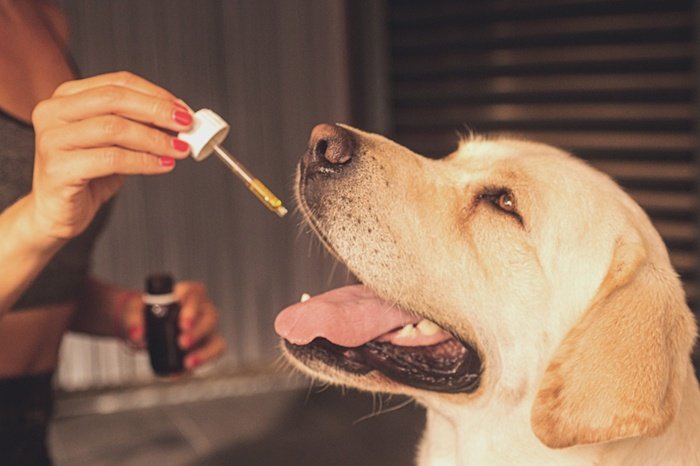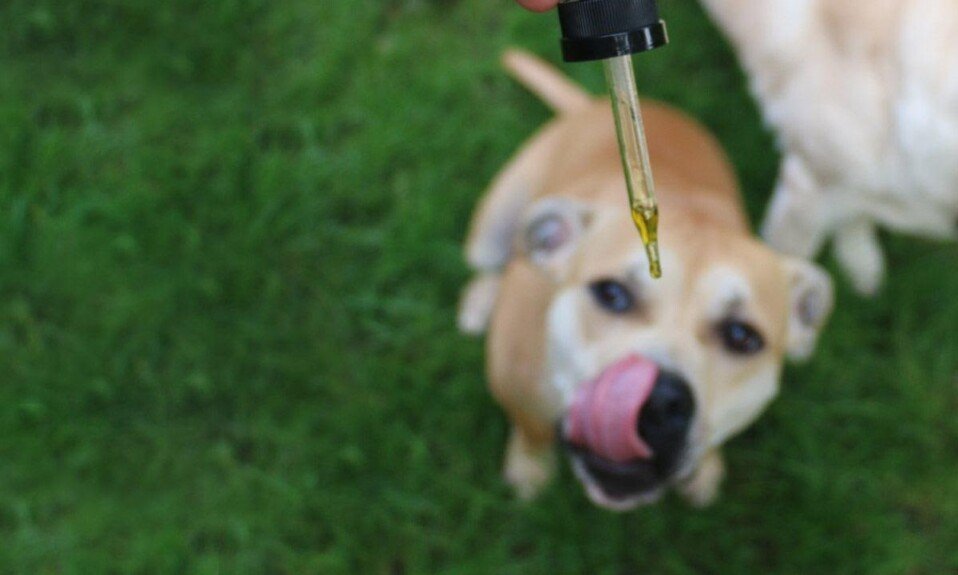Due to the growing trend in the CBD industry, there’ve been many questions floating online about the effectiveness of the compound and some of the benefits it provides to dogs.
As you read on, you will find out what CBD is, its benefits to dogs, how it interacts in the system of dogs, and its dosage and potential side effects. Let’s get right to it.
What is CBD Oil?
CBD, short for cannabidiol, is a compound gotten from a hemp plant’s leaves and buds. Studies have shown that although it is derived from the notorious hemp plant, it doesn’t possess any psychoactive properties, and so it is deemed safe and healthy to consume.
It doesn’t contain tetrahydrocannabinol (THC), the compound responsible for the psychoactive behaviors of consumers of marijuana. Experts have proven that marijuana contains as much as 30% THC, which causes the alteration in its consumers’ minds.
On the other hand, CBD contains as little as 0.03% THC, and that is why it doesn’t get its users “high.” You can learn more here about the difference between THC and CBD.
How Does CBD Interact with Dogs?

As of now, there hasn’t been conclusive evidence on how cannabidiol affects the system of your furry companions. What researchers have discovered to be true is that there is a presence of endocannabinoid system located in the peripheral nervous system of dogs, that when CBD is prescribed, it goes directly to the nervous system, which helps to maintain and improve their overall health.
Experts have said that if there’s a deficiency of cannabinoids in the system of your furry friends when CBD is prescribed to them, it helps to manage the deficit. Studies have also shown that there can be a reduction in the level of cannabinoids, and it can result in several health problems that can hamper your dog’s living conditions.
So, as a pet parent, it is suggested that you regularly administer cannabis to your canine to boost their endocannabinoid system to improve their quality of life and maintain their overall health.
What are the Benefits of CBD oil to Dogs?
As stated earlier, while there isn’t any conclusive evidence on the effectiveness of cannabidiol for pets in general, there are testimonies from vets and dog parents on how effective the compound is for treating several medical conditions, which are as follows.
-
Stress and Anxiety
Many dog parents have provided testimonies and positive feedback on how cannabidiol helped to deal with the stress and anxiety that their furry friends were suffering from. Dogs are sometimes riled-up and uneasy about unfamiliar sounds and objects, resulting in them developing sweaty paws. When cannabidiol is administered to your pet, it helps them relax and relieve the anxiety that they are dealing with at that particular time.
-
Pain
CBD is a potent pain reliever because of the properties it has. When cannabidiol is administered to dogs suffering from pains brought on by certain medical conditions, it has been proven that it acts as a strong pain reliever for them.
Also, cannabidiol is active in combating inflammatory conditions such as arthritis, hepatitis, and epilepsy. The link here, https://www.medicalnewstoday.com/articles/322051 has more on using cannabis for pain.
-
Skin Problems
Even if you can’t identify specific skin problems that your dogs might be suffering from, CBD is an excellent remedy for skin problems. The skin consists of several endocannabinoid receptors, that when cannabidiol is prescribed, it binds with the receptors and enhance their functions.
If you notice changes in your furry companion’s skin, let’s say it doesn’t glow as it used to, we suggest that you administer CBD because it helps to replenish skin nutrients and improve skin health.
Below are a few other conditions that CBD helps to remedy.
- Cancer in dogs
- Seizures
- Loss of appetite
- Insomnia
- Depression
- Chronic pain
- Digestive problems
Likely Side Effects of Using CBD Oil for Dogs
While there is no conclusive data on the side effects of cannabidiol, there are potential side effects based on how it affects humans. Also, to reduce the possibilities of side effects, make sure you follow the recommended dosage.
Dry mouth: Studies have shown that cannabidiol can reduce the production of saliva. For dogs, this would result in a dry mouth and an increase in thirst.
Lowered blood pressure: Overdose of cannabidiol causes lowered blood pressure, which can cause light-headedness.
Drowsiness: Dog parents are known to use cannabidiol to manage the symptoms of anxiety in their pets. While CBD has a calming effect, it can cause drowsiness, mostly when consumed in high doses.

Dosage of CBD
It is imperative that when you’re prescribing cannabis to your pets, that you follow the recommended dosage. And as such, it is best to consult your vets’ advice before giving your dogs the compound.
Usually, it is best to start with little doses. However, if there is no notable change in result, you increase the amount until there is an improvement in your furry friends’ quality of life.
How to Get Quality CBD Oil for Dogs?
If you have been recommended cannabidiol for your pets, it is vital that you get quality ones that can provide the required benefits. You can find brands that offer a great price for pet supply, so you want to research them.
Below are some tips to get the best products:
-
Make sure it is Organic
If the cannabidiol oil you are purchasing isn’t organic, it won’t improve your pet’s quality of life. For this reason, your provider should provide you with a third-party test result stating that the product is organic and free from pesticides and harmful solvents that can cause problems for your pet.
-
Buy CBD as a Liquid
There are different forms of cannabidiol products. However, since you will be administering it to your dogs, it is best to buy them in oil tinctures to make the process easier for you.
-
Check Labels and Packaging
To ensure that you are provided with a safe and quality product, you have to check the labels or packaging of your product. Your products should state the level of THC present in it, and also should be full-spectrum or the whole plant.





